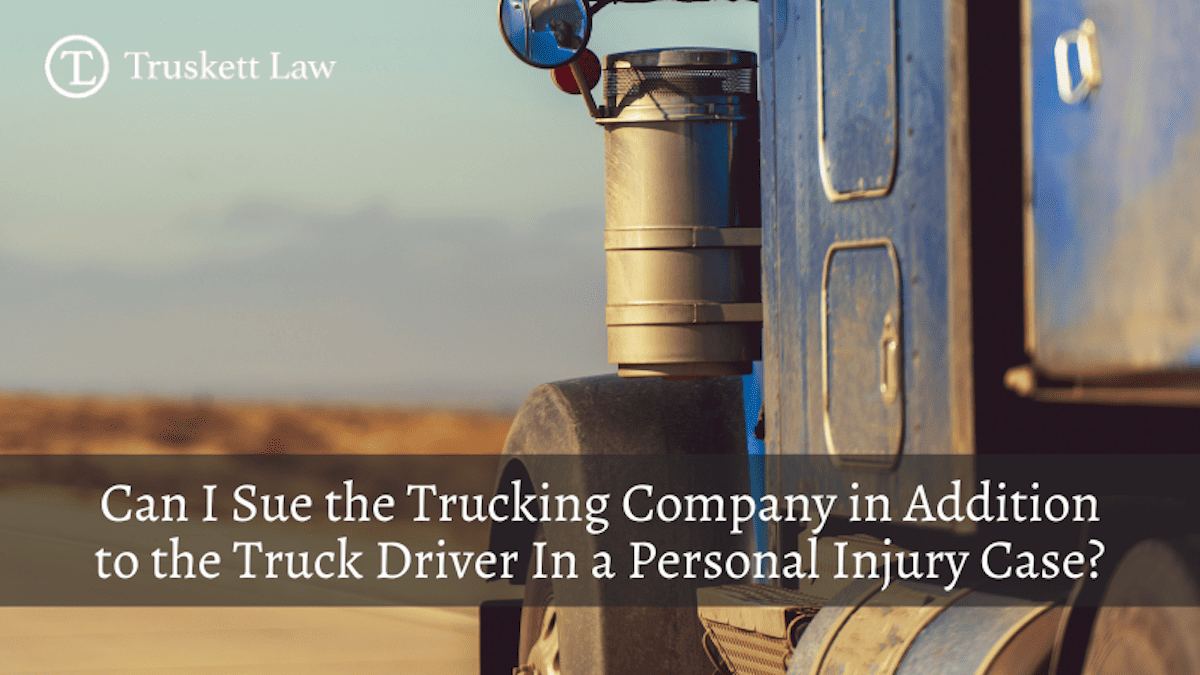
25 Jun Can I Sue The Trucking Company in Addition to the Truck Driver In a Personal Injury Case?
Who to Sue In a Truck Driver Personal Injury Case
In personal injury cases involving accidents with commercial trucks, many individuals wonder if they can sue not only the truck driver but also the trucking company.
This article aims to provide clarity on this topic and explore the possibilities of holding both parties accountable for personal injury claims. Whether you’ve been involved in a truck accident or you’re simply curious about the legal options available, this article will guide you through the process.
So, can you sue the trucking company in addition to the truck driver in a personal injury case? The answer is yes, in many cases, you can sue the trucking company along with the truck driver in a personal injury case.
When a truck driver is employed by a trucking company, the company may be held legally responsible for the driver’s actions, including negligence or recklessness that led to the accident.
However, it’s essential to understand the legal principles and factors that determine the trucking company’s liability.

Factors Determining Trucking Company Liability
- Employment Relationship: To establish the trucking company’s liability, it must be proven that an employment relationship exists between the company and the truck driver. If the truck driver is an independent contractor and not an employee, the trucking company might not be held liable for their actions. However, many truck drivers are employees of the company, making it easier to hold both parties accountable.
- Vicarious Liability: This is a legal principle that holds employers responsible for the actions of their employees within the scope of their employment. In the context of a truck accident, if the driver was performing their job duties at the time of the accident, the trucking company can be held vicariously liable for the driver’s negligence. This means that even if the trucking company was not directly involved in the accident, it can still be held responsible.
- Negligent Hiring or Supervision: Apart from vicarious liability, the trucking company can also be held directly liable for their own negligence in hiring or supervising the truck driver. If it can be proven that the company failed to conduct adequate background checks, neglected to ensure the driver’s qualifications, or overlooked any red flags during the hiring process, they may be held responsible for their negligence.
Steps to Sue the Trucking Company and Truck Driver
If you decide to pursue legal action against both the trucking company and the truck driver, it’s crucial to follow the necessary steps to build a strong case. Here’s an outline of the process:
- Consult an Attorney: Seek legal advice from a personal injury attorney experienced in handling truck accident cases. They will guide you through the legal procedures and ensure your rights are protected.
- Investigation: Your attorney will conduct a thorough investigation into the accident, gathering evidence such as accident reports, witness statements, and any available video footage. They may also subpoena the trucking company’s records to uncover any negligent practices.
- Establish Liability: Your attorney will work to establish liability on the part of both the trucking company and the truck driver. This may involve proving negligence, demonstrating an employment relationship, or uncovering instances of negligent hiring or supervision.
- File a Lawsuit: Once liability has been established, your attorney will file a lawsuit on your behalf. The lawsuit will outline the damages you are seeking and provide a legal basis for holding both the trucking company and the truck driver accountable.
- Negotiation or Trial: In many cases, personal injury lawsuits are settled through negotiation outside of court. Your attorney will work to negotiate a fair settlement that compensates you for your injuries. However, if a fair settlement cannot be reached, your case may proceed to trial, where a judge or jury will decide the outcome.
Alternatives To Suing A Trucking Company Or Truck Driver For Personal Injury
When seeking alternatives to suing a trucking company or truck driver for personal injury, individuals can explore options such as mediation or arbitration. These alternative dispute resolution methods offer a more cooperative and less adversarial approach to resolving personal injury claims.
Through mediation or arbitration, parties can work together with a neutral third party to reach a mutually satisfactory resolution outside of the courtroom.
These methods often provide a quicker and more cost-effective means of settling disputes, allowing individuals to avoid the lengthy and potentially stressful process of a lawsuit.

Suing The Trucking Company You Work For As A Truck Driver For Personal Injury
Suing the trucking company you work for as a truck driver for personal injury can be a complex and delicate situation. As an employee, pursuing legal action against your own employer requires careful consideration of the potential implications.
In such cases, it’s crucial to consult with an experienced personal injury attorney who specializes in trucking accidents. They will assess the circumstances of the accident, investigate any negligence or unsafe practices on the part of the company, and guide you through the legal process.
It’s important to note that suing your employer may have repercussions on your employment status, so it’s vital to weigh the pros and cons before proceeding with a lawsuit.
Types Of Personal Injury Damages You Can Sue A Trucking Company And Truck Driver For
In a personal injury case against a trucking company, there are various types of damages that you can claim. These damages aim to compensate you for the physical, emotional, and financial losses you have suffered as a result of the accident.
- Firstly, you may be able to claim medical expenses. This includes the costs of hospitalization, surgeries, medications, physical therapy, and any other necessary medical treatments related to your injuries. It’s essential to keep thorough records of all your medical expenses to support your claim.
- Secondly, you can seek compensation for lost wages. If your injuries have caused you to miss work or have resulted in a reduced earning capacity, you can claim the income you would have earned during that time. This includes not only your current lost wages but also any potential future income that you may be unable to earn due to the long-term impact of your injuries.
- Furthermore, you can pursue damages for pain and suffering. This category of damages seeks to compensate you for the physical and emotional pain, trauma, and distress you have experienced as a result of the accident. It takes into account factors such as the severity of your injuries, the impact on your daily life, and any long-lasting effects on your overall well-being. The specific amount of compensation for pain and suffering can vary based on the circumstances of your case and the jurisdiction in which the lawsuit is filed.
Conclusion
When pursuing a personal injury case arising from a truck accident, it is often possible to sue the trucking company in addition to the truck driver. The trucking company’s liability can be established through an employment relationship, vicarious liability, or negligence in hiring or supervision.
By consulting with an attorney and following the necessary legal steps, you can seek compensation from both parties involved, ensuring that you receive the full compensation you deserve for your injuries.

Related Questions
Can I sue the trucking company if the truck driver was an independent contractor?
If the truck driver is classified as an independent contractor and not an employee of the trucking company, it may be challenging to sue the company. However, it’s best to consult with a personal injury attorney who can review the specific details of your case and advise you accordingly.
How long do I have to file a personal injury lawsuit against the trucking company and the truck driver?
The time limit, known as the statute of limitations, for filing a personal injury lawsuit varies by jurisdiction. It’s crucial to consult with an attorney as soon as possible to ensure you meet all deadlines and protect your legal rights.
Can I still sue the trucking company if I was partially at fault for the accident?
Depending on the jurisdiction, you may still be able to pursue a personal injury lawsuit against the trucking company, even if you were partially at fault for the accident. However, your recovery may be reduced based on the percentage of fault assigned to you. Consult with an attorney to understand how the laws apply in your specific location.


Sorry, the comment form is closed at this time.